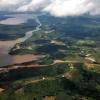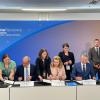Press Releases
Displaying Results 1 - 25 of 364
Countries from across the pan-European region have reaffirmed the need for multilateral cooperation to address major and emerging industrial safety challenges at the thirteenth meeting of the Conference of the Parties to the UNECE Industrial Accidents Convention (CoP-13), held in Geneva on 27
In response to rising risks of accidents as the scale and scope of industrial activities increases to meet the demands of the energy transition, governments from across the pan-European region have decided to strengthen cooperation to ensure safety by expanding work under the UNECE Convention on
Integrating climate change into all public policies; improving the environmental information system, compliance, surface and groundwater monitoring and biodiversity; enforcing the law on environmental, waste and chemicals management; and stepping up efforts for the sustainable management of
The acceleration and financing of energy transition, enhancing international cooperation in environmental protection, decarbonization of all modes of transport, and advancing climate action at the local and regional level were in the focus of UNECE’s engagements at COP29 in Baku, Azerbaijan. The
On the sidelines of the Tenth Session of the Meeting of the Parties to the Water Convention (MOP 10), ministers responsible for water resources in The Gambia, Guinea-Bissau, Mauritania, and Senegal convened to take a significant step toward enhancing regional cooperation over the Senegal-Mauritania
Over the past 13 years, Azerbaijan has taken important steps in improving its environmental performance, in particular in strengthening its policy framework, developing protected areas and establishing a Commission on Water Management. However, a number of key issues remain to be addressed
The third Environmental Performance Review (EPR) of Kyrgyzstan, undertaken by UNECE, will support the government to strengthen climate action and address pressing environmental challenges, including in mountainous areas.
The main findings of the EPR were presented by UNECE and the
A high-level meeting at COP29, co-organized by the COP29 Presidency, Ministry of Economy of Azerbaijan, UNECE and UNESCAP, saw the introduction of the SPECA Multi-Partner Trust Fund, while high-level representatives of SPECA participating States of the United Nations Special Programme for the
As leaders gather for the COP29 UN Climate Change Conference taking place on 11-22 November in Baku, Azerbaijan, Executive Secretary Tatiana Molcean will lead a UNECE delegation that will be fully engaged to support urgently-needed climate action, leveraging cooperation and its practical resources
Nearly 100 countries gathered in Ljubljana for the 10th session of the Meeting of the Parties (MOP10) to the Water Convention (23-25 October), organized by UNECE in cooperation with the Government of Slovenia, to discuss how the Convention can help advance transboundary cooperation and increase
Transport plays a crucial role in society and in the economy, enabling access to jobs, services and people, while driving trade and tourism. However, it also brings significant socioeconomic, environmental and health challenges. In most countries, public policies at all levels do not deal with
Amid floods in Central and Eastern Europe and droughts in Southern Africa, governments are turning to the UN Water Convention to help jointly address water-related impacts of the climate crisis. The surge in extreme weather events underscores the urgent need to strengthen climate resilience through
10th Meeting of the Parties to UN Water Convention to advance cooperation on global water challenges
In response to recent devastating floods in Central and Eastern Europe and a drought emergency in Southern Africa, cross-border water management has become a pressing issue on the global political agenda. Against this backdrop, the 10th session of the Meeting of the Parties to the Water Convention
For International Day for Disaster Risk Reduction (13 October), UNECE warns that climate change and the energy transition are increasing the likelihood of catastrophic accidents linked to industrial and technological facilities such as chemical plants, battery factories, mining sites and energy
A new report by UNECE and UNESCO sounds the alarm on the lack of international cooperation to manage shared rivers, lakes and aquifers, calling for urgent collaboration among countries. Slow progress threatens to delay joint strategies needed to address the intensifying impacts of droughts and
Indicators are vital tools in environmental and economic policymaking. They simplify complex issues into manageable metrics, guiding decision-making, assessing performance and ensuring accountability. By providing a structured approach, indicators help set objectives, monitor progress and evaluate
In response to severe drought and ongoing water scarcity, Zambia has joined the UN Water Convention to improve water management both within and across its borders. The country, which declared a National Crisis and Emergency in February 2024 due to a drought that has severely impacted food and
While the world is gearing up for the summit of the future and the climate COP 29 to find solutions to global crises, another problem related to the planet we all share is often overlooked: air pollution. On International Day of Clean Air for blue skies, celebrated on 7 September every year, we
Zimbabwe, a landlocked country in drought-stricken Southern Africa, has joined the UN Water Convention in a clear demonstration of political will for water cooperation across borders. Home to some 17 million people, Zimbabwe faces pressing water challenges linked to climate change and competing
Faced with increasing water stress and climate change impacts on the water resources it shares with its neighbours, Cote d’Ivoire has joined the United Nations Water Convention – a UN treaty to improve joint water management across borders.
It is the 53rd Party to the Convention and 10th
Young entrepreneurs and changemakers must be equipped with the necessary knowledge, skills, and mindsets to navigate complex challenges and lead change towards a healthier and more sustainable world. At first of its kind international Forum for Europe, Central Asia and North America, held this week
More than two years since Russia’s full-scale invasion of Ukraine, the country has experienced considerable environmental destruction with both immediate and longer-term consequences on human health, ecosystems, the Ukrainian economy and beyond. Attacks on infrastructure and industry have resulted
Ahead of the Ukraine Recovery Conference in Berlin on 11 – 12 June 2024, UNECE Executive Secretary Tatiana Molcean visited Kyiv from 4 to 6 June to discuss UNECE support for the country’s reconstruction and recovery with Ukrainian government officials, the United Nations Country Team, the
Walking is a key component of a public transport journey. Travel surveys repeatedly show that nearly all public transport users walk as part of their trip. According to a study conducted in 12 European cities between 2016 and 2022 by the Research Institute Socialdata, Stavanger, München, an average
In the declaration issued following their latest meeting in Milan, G7 transport ministers have recognized the role of UNECE in advancing sustainable low-carbon mobility. In particular, they welcomed the recently adopted UNECE Strategy on Reducing Greenhouse Gas Emissions from Inland Transport,




















